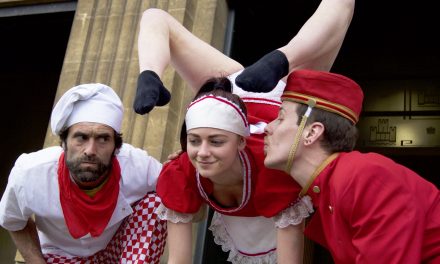Simon Callow and Jane Asher in rehearsal – photo Nobby Clark
It is hard not to feel that you are present at a little bit of theatrical history while watching A Song At Twilight with Simon Callow and Jane Asher taking the lead roles. This Noel Coward four-hander was first presented in 1966 as part of a double bill of plays called Suite in Three Keys, with the common element being the hotel waiter Felix. Simon Callow is a distinctive theatrical force majeure in British theatre who always yields a memorable performance across a very broad range of works from the sublime to the profane. Jane Asher is a hyper-productive actress who manages to combine a busy life on the boards with a successful business life and some rock star relationship fame from her younger acting days. It is impolite to age a star but with over 140 years of life experience between them these two have been a part of our lives all along.
Noel Coward was born on the cusp of a new century and his personal contribution to the cultural life of the twentieth century developed in close parallel with that troubled hundred, but he was always ahead of the social mores and trends and would find himself very comfortable with current moral values. Yet when this work was premiered in 1966 with Coward himself taking the lead role in his swan song theatrical performance the issue of homosexuality was at a critical point in social progress, still illegal but increasingly recognised as an involuntary part of many people’s lives. He received great reviews from practically all critics with the (to him) pleasing exception of the Sun ‘newspaper’.
Callow, like Coward before him, plays the role of Hugo Latymer, an ageing writer and playwright cared for by his devoted German wife and secretary Hilde (Jessica Turner). Lodged in a Swiss hotel with a nice view they are served graciously by hotel waiter Felix (Ash Rizi). Hugo is nervously awaiting a visit from former lover Carlotta (Jane Asher) who he dumped decades ago after two year romance. She returns for reasons unclear to Hugo, but in essence comes to confront him about the reasons for his rejection of her and what that says about his true character. She has ownership of letters, from Hugo, to both her and another former lover.
Part of the joy of this play is the shifting power between the characters. Centre of his own successful world Hugo is bombastic and male, but the tide of empathy slowly but inexorably turns as we see the truths of his relationships with these two determined women set out. Past actions come back to thwart his bombast, but this subtle work does more to understand than to damn, reflecting no doubt some of the challenges that Coward himself would have faced in his lifetime. Two characters who never appear on stage give the edge to this tale, Hilde’s lesbian pal Leisel and Hugo’s former secretary Perry Sheldon, with whom he was closely involved but ultimately rejected.
While this play challenges the pressures that individuals felt to conform with social norms of the time it gives us enough depth in each character to understand rather than just condemn their actions. Probably quite a brave stance in 1966 England.
There is little doubt about the worthiness of this play. But worthy can be dull. Is this? In truth, towards the end of the first half I was beginning to think so. Perhaps we are spoiled by the brash immediacy, reckless pace and sheer noise of modern stage work and this production is gloriously free of those things. Noel Coward was a master of stage skills and his deliberate and deliberative timing gives the precisely right context to the human events that he unfolds for us. The pace picks up after the interval and at some moments we might almost wish to return to the languor of the first act as twists and turns spill out before us.
What keeps us in our seats and spellbound is the sheer quality of the performing skills of all four on stage. Callow and Asher have never lacked for bookings, and we can see why, but their co-stars Jessica Turner and Ash Rizi are pitch perfect and equally engaging. They give us an insight into lives half a century ago that were rearranged and ordered by a moral code that did not recognise true feelings. We are lucky to live for now in a country of tolerance and understanding, but everyday news reminds us that in many countries these malign pressures of intolerance still blight lives.
Norwich Theatre Royal is the setting for a play that does not need to shout to capture your attention featuring two of the more remarkable actors of recent generations who are inhabiting characters that could have been written just for them. The Coward script is of course full of pithy one liners and memorable phrases. The single set is elegant and in a first for the Theatre Royal in recent years there is absolutely no use of a smoke machine! Director Stephen Unwin has carefully crafted a quietly confident masterpiece that makes for a rewarding evening reminding us of the unsurpassed skills that Noel Coward brought to the world’s stages.
© Julian Swainson 2019
Listing:
A Song At Twilight, Monday 8-Saturday 13 April at 7.30pm, and Wed and Sat matinees at 2.30pm. Tickets £10-£33.50. Discounts for Friends, Corporate Club, Over-60s, Under-18s and Groups.
To book, log onto www.theatreroyalnorwich.co.uk or call the box office on 01603 630000.





Recent Comments